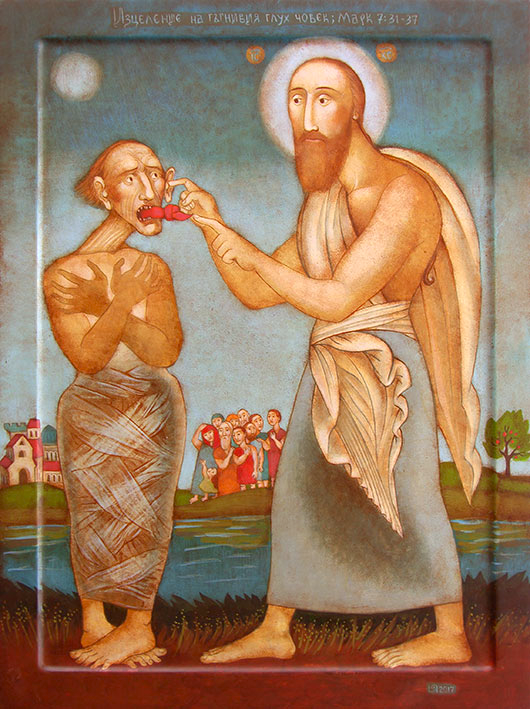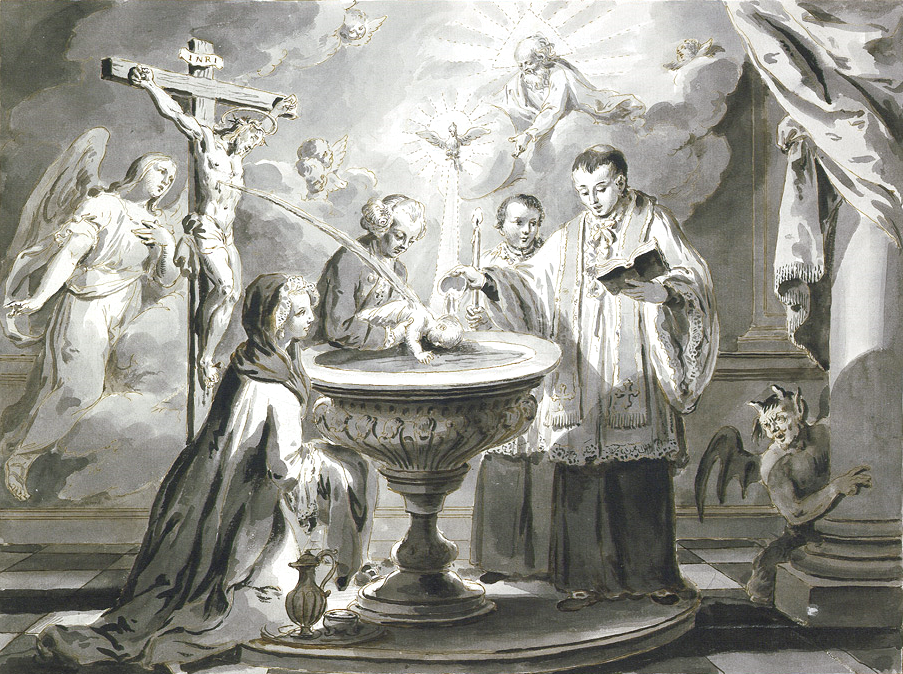Translation of the Epistle for the Eleventh Sunday After Pentecost
Brethren: I recall to your minds the Gospel that I preached to you, which also you received, wherein also you stand, through which also you are being saved, if you hold it fast, as I preached it to you – unless you have believed to no purpose. For I delivered to you first of all, what I also received, that Christ died for our sins according to the Scriptures, and that He was buried, and that He rose again the third day, according to the Scriptures, and that He appeared to Cephas, and after that to the Eleven. Then He was seen by more than five hundred brethren at one time, many of whom are with us still, but some have fallen asleep. After that He was seen by James, then by the Apostles. And last of all, as by one born out of due time, He was seen also by me. For I am the least of the Apostles, and am not worthy to be called an Apostle, because I persecuted the Church of God. But by the grace of God I am what I am, and His grace in me has not been fruitless.
Translation of the Holy Gospel According to Mark
At that time, Jesus departing from the district of Tyre came by way of Sidon to the sea of Galilee, through the midst of the district of Decapolis. And they brought to Him one deaf and dumb, and entreated Him to lay His hand upon him. And taking him aside from the crowd, He put His fingers into the man’s ears, and spitting, He sighed, and said to him, Ephpheta, that is, Be opened. And his ears were at once opened, and the bond of his tongue was loosed, and he began to speak correctly. And He charged them to tell no one. But the more He charged them, so much the more did they continue to publish it. And so much the more did they wonder, saying, He has done all things well. He has made both the deaf to hear and the dumb to speak.
Transcription of Homily
The Saving Words of the Gospel.
He has done all things well.
In the Name of the Father, and of the Son, the Holy Ghost. Amen.
In this Gospel, we have Our Lord passing through this District of Tyre, which means a narrow place, and Sidon, which means hunting, in the Decapolis. So, the Decapolis was about 10 pagan towns all kind of clumped together. And they bring Him this man suffering from deafness, and he’s not absolutely mute, that would be αλολον [alogon]. But, as a result of his hearing problem, he cannot really speak well – and that’s μογιλαλον [mogilalon]. So, this is like a speech impediment; he’s not speaking correctly. In fact, once he’s healed, that’s why it says, then he spoke correctly. In other words, he would try to perhaps mimic what he was hearing and seeing, but it wasn’t really coming out too well. So, Our Lord then manifests the reality of the Incarnation through using His finger and His saliva. His Sacred Humanity enters into this man’s life.
And Our Lord does several things that reveal that His humanity is real. There were early Church heretics who thought that Christ was God pretending to be man, and this was one of the early heresies. And others who didn’t think He was divine. And Our Lord here in this Gospel reveals both of those realities at once; His Sacred Humanity and His divinity. So, He touches the man with His finger. Elsewhere in Mark’s Gospel, the Finger of God is used when He’s casting out Demons. And they say, if he’s casting out demons, it’s by the finger of God, which the Church Fathers are pretty much unanimous in calling the Holy Spirit. And what does He do? He lifts up His eyes to heaven. And He groans. He prays in His Sacred Humanity, but then He gives the divine command, Be opened. So, there we see both of those realities, both natures at work, in this one Person, something that only God can do. He doesn’t implore; the Divinity doesn’t implore the Divinity; He just commands and makes it so with that same Word that He used to create what exists by just speaking it into existence.
But notice, too, that He calls the man aside. In other words, He wants this to be in the context of discretion. He’s not like some televangelist looking for followers who are attracted by extraordinary things. Rather, He calls the man, pulls him aside, and heals him.
Our Lord wants our faith to be rooted in His Passion, Death, and Resurrection, not in these wonders because we see wonder upon wonder upon wonder and these people will be nowhere to be found on Good Friday. And so, this type of morbid curiosity doesn’t go very far. Our Lord doesn’t want trust in Him to be rooted in this. And nonetheless, His charity impels Him to address people in need.
In the traditional form of baptism, we see something of a replication of these rubrics in which the priest baptizing takes some saliva and puts it on the mouth of the one to be baptized. The ears are blessed. And so, this is something of a replication of these rubrics that we see Our Lord doing.
When we were invaded by grace in the moment of baptism, God took up residence in our souls and elevated our nature to a participation in His divinity. So, this is what Our Lord does in baptism, but there has to be a bit of post-baptismal restoration in our cases, as well. One thing is to receive all of those graces; the priest anoints the mouth, in order for the baptized to praise God. Obviously outside of grace, our prayer has no merit. He opens the ears. In that gesture in the baptism to open the candidate for baptisms, ears, for the preaching of the truth of the Church.
If we’ve committed any sins, we’ve brought upon ourselves a certain disorder. St. Thomas Aquinas says that the disorder of original sin – and its fourfold; disordered passions, darkened intellect, proclivity to malice, and mortality – that these wounds of original sin do not match up to the disorder we bring upon ourselves through one venial sin, says Thomas Aquinas. Why? Because that venial sin was willed. We chose to offend Our Lord. Nobody chooses original sin except for Adam and Eve. We are the inheritors of that sorry state, but when we choose to go against our conscience when we choose to do something that we know is offensive to Our Lord, Thomas Aquinas tells us that that brings about a greater disorder than this inherited disorder. And nonetheless, that disorder doesn’t have to have the last word.
St. John of the Cross, one of the greatest mystical writers in the history of the Church, tells us that our life of faith, the exercise of theological faith, brings about a reordering of our intellect for any misuse of our intellect. So, the theological virtue of faith has that effect, that healing effect, to whatever disorder there may have been brought about through our sinful thoughts. He also says that, through the bad things we’ve done in the memory, the bad memories we’ve inflicted upon ourselves, that is precisely the virtue of hope that brings about a reordering of our memory. And charity is not simply on the human level of being kind, obviously, charity as a theological term which is the Divine Presence within us; only present if we’re in a state of grace. The exercise of charity, the theological virtue of charity, brings about a reordering of our will. So, for all of the self-imposed disorder that we’ve done to ourselves, this self-wounding, Our Lord comes to us with solutions.
John Henry Newman tells us in his sermon On the Intellectual Sufferings of Christ in the Passion, he tells us that Christ refused to drink the drugged vinegar while He was on the Cross, which would have deadened His pain. He says He refused that because He wanted to have absolute clarity of thought as He was offering up the Sacrifice. And this absolute clarity of thought, says St. John Henry Newman, was so that He could redeem our memories. So, notice how we’ve all either had traumas, and or committed sins that can afflict our memory, and those don’t have to have the last word.
We can make a sort of a spiritual communion with the Precious Blood, asking the Precious Blood to pour down on the memory of a certain event. When we go into Adoration, we can ask Him to pour His Precious Blood over that event, and over the memory of that event, so that He can claim that for Himself, and the evil one will have less access to that memory. And so, Our Lord constantly comes to us with solutions for all of the harm that we’ve done to ourselves. And because He is rich in mercy, when He forgives us, we’re very much akin to this man who’s on the receiving end of His Bounty: Our ears are cleansed so that we can hear His word we can hear the truth of the Faith, and our tongues are loosed so that we can praise Him now and in eternity.
In the name of the Father, and of the Son, the Holy Ghost. Amen.
— Fr. Ermatinger




